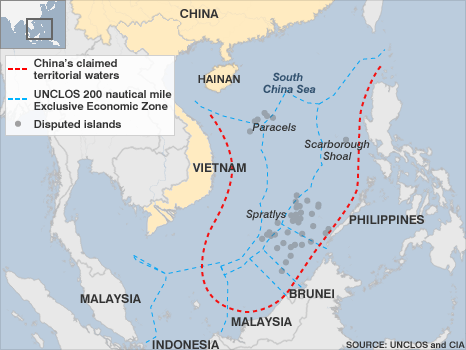Note from Jay Pinho: Below is the inaugural guest post on The First Casualty, with many more to come. Erik Landstrom is a master’s degree candidate in International Affairs at the School of International and Public Affairs (SIPA) at Columbia University in New York. His studies concentrate on Energy and Environment, which he blogs about at his new site, Erik Landstrom on Energy. This post is adapted from one on his site.
If you weren’t aware of it, I will try to update you on a little-known fact that has, strangely enough, avoided much media attention, crowded out by “You didn’t build that” and most recently the “47%.” Right now the second- and third-largest economies in the world, Japan and China, are engaged in a territorial dispute that has a significant probability of getting worse before it gets better. They are fighting over a seemingly worthless rock formation in the South China Sea (the same one that figured in the 2010 fishing boat incident, if you remember).

So why are they fighting about these seemingly worthless rocks? Most of you probably know the answer: potential mineral and hydrocarbon resources that exist in the area, as well as fishing rights. Both countries are signatories to the UNCLOS, or in plain-speak “Law of the Sea,” which stipulates that any state might claim an Exclusive Economic Zone (EEZ) 200 nautical miles (nm) out to sea. Inhabitable islands have the right to claim this as well; however, the above island should by all rights be classified as an uninhabitable rock, reducing its ability to claim significant surrounding space. China does not take this stance. (I will return to talk about UNCLOS in other posts, specifically why the U.S. has not signed it.)
In other words, this rock is not worthless. It is potentially more expensive per gram/ounce than had it been made out of pure gold! Prove that it is inhabitable and you win the jackpot.
So the rock formation has become the center of attention for world power politics and is a likely stage for many future skirmishes and standoffs. Especially taking into account China’s current build-up of naval capabilities coupled with its claim (se e below) to basically the entire contested area, the entire region is slightly worried. Leon Panetta, the US Defense Secretary, is in the region to continue talks on a regional ballistic missile system that will protect Japan from attacks by North Korea, but as we can all see from the timing it will probably serve a dual purpose. China’s response was to launch a major naval exercise involving around 40 missiles.
e below) to basically the entire contested area, the entire region is slightly worried. Leon Panetta, the US Defense Secretary, is in the region to continue talks on a regional ballistic missile system that will protect Japan from attacks by North Korea, but as we can all see from the timing it will probably serve a dual purpose. China’s response was to launch a major naval exercise involving around 40 missiles.
No one knows how much oil or gas exists in the South China Sea as no exploration data exists (only estimations). The estimations of oil resources have ranged between ~20bn barrels and ~200 barrels, and gas reserves are said to be around 900tcf (trillion cubic feet). For those of you that have a hard time putting the numbers in perspective, the U.S., which is the 3rd-largest oil producer in the world, has between 22-30bn barrels of P90 (90% probability) oil reserves. And Qatar, which has the 3rd-largest gas reserves, has 884tcf. How much exists around this specific rock formation is unknown.
Related articles
- DFA: China invokes UN law vs Japan but not against Philippines (globalnation.inquirer.net)
- China accelerates exploiting oil in South China Sea (indiavision.com)
- A Guide To The Intense Maritime Disputes Across The South China Sea (businessinsider.com)
- Turbulence in Pacific seachange (bostonherald.com)
